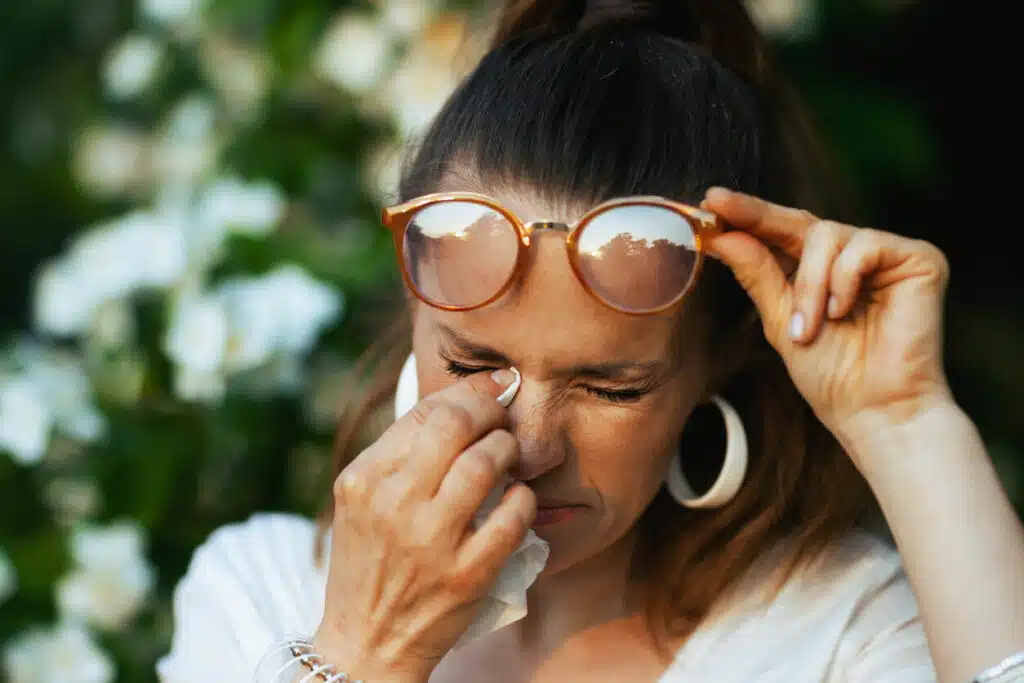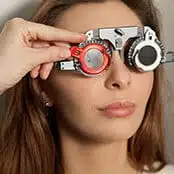
Eye allergies, also known as allergic conjunctivitis, can affect your daily life in many ways. They lead to discomfort, blurry vision, and even light sensitivity.
Understanding what happens during your eye allergy treatment can ease concerns and improve your experience. Let us explore what causes eye allergies, symptoms you may encounter, treatments you can expect, and how they provide relief.
What Causes Eye Allergies
Eye allergies occur when your immune system reacts to harmless substances in your environment. These allergens may include various triggers, such as the following:
- Pollen during spring, summer, or fall
- Pet dander from cats or dogs
- Mold spores in damp environments
- Dust mites found in household dust
- Perfumes or chemical fumes
When exposed, your body releases histamines, which trigger redness, itching, and swelling in your eyes. Identifying and avoiding these allergens is the first step in managing symptoms.
Eye Allergy Symptoms in Adults
Eye allergy symptoms can range from mild to severe. These vary per person, but you might experience the following signs:
- Redness in the whites of your eyes
- Itchy or watery eyes
- Sensitivity to lights
- Swollen eyelids or puffiness
- Gritty sensation, as if sand is in your eyes
If your symptoms last for an extended time or intensify, seeking prompt eye allergy treatment is essential for relief.
Things to Expect from Your Eye Allergy Treatment
Here are some things that you can expect from eye allergy treatment.
Comprehensive Diagnosis
Your eye doctor will start with a thorough review of your medical history and current symptoms. They may perform an exam to evaluate the extent of your condition and rule out other possible causes. An accurate diagnosis allows your doctor to offer comprehensive eye care.
Allergy Testing
If the cause of the allergy is unclear, your eye doctor may recommend allergy testing. This helps pinpoint specific allergens triggering your symptoms. Knowing your triggers is essential for effective eye allergy treatment.
Over-the-Counter Medications
There are various over-the-counter remedies available at your local pharmacy, such as antihistamine eye drops. These help block the release of histamines within minutes and offer quick relief. Examples include Olopatadine (Pataday) or Ketotifen (Zaditor).
Prescription Medications
For persistent eye allergy symptoms in adults, you may need prescription-strength eye drops. Mast-cell stabilizers or corticosteroids provide long-term and targeted relief.
An example of eye drops prescribed by ophthalmologists includes Cyclosporine (Restasis), commonly used for dry eye relief and itchiness reduction.
Artificial Tears
Artificial tears, which are well-known for dry eye relief, are an effective way to flush allergens from your eyes. They keep your eyes hydrated, especially when paired with other treatments.
Immunotherapy
If your allergies are severe and ongoing, your eye doctor can recommend you to an allergist. Your allergy doctor may recommend immunotherapy, such as allergy shots. These shots help your immune system become less sensitive to allergens over time.
Lifestyle Modifications
Your eye doctor will advise on how to minimize allergen exposure. This can involve wearing wraparound sunglasses outdoors, using an air purifier at home, or switching to hypoallergenic beauty or personal care products.
How Eye Allergy Treatments Provide Relief
Eye allergy treatments not only reduce symptoms but also improve your overall comfort. For those experiencing dry eye relief, these treatments hydrate the eyes and help clear allergens. Treatments may also decrease sensitivity to light and reduce inflammation, ensuring better productivity and focus throughout your day.
If your eye doctor suspects additional conditions like glaucoma or an infection, further testing might be necessary. A combination of these strategies ensures maximum relief tailored to your specific needs.
How to Manage Eye Allergies at Home
While professional care is important, you can take steps at home to manage symptoms effectively.
- Use a Cold Compress: Soothe swollen or itchy eyes with a clean, damp cloth chilled in the refrigerator.
- Follow the 20-20-20 Rule: To combat dryness, look away from screens every 20 minutes and focus on an object 20 feet away for 20 seconds.
- Keep Indoor Air Clean: Regularly wash bedding, use air filters, and vacuum carpets to reduce indoor allergens.
- Stay Hydrated: Drinking plenty of water can naturally reduce dryness in your eyes and improve eye health overall.
Eye Allergy Treatment in Washington, MO
At Advanced Sight Center, we understand how precious your vision is to you. Our expert ophthalmologists and optometrists use the latest advancements to manage eye allergies and provide effective solutions. Whether you need eye allergy treatment, dry eye relief, or a tailored plan for managing eye allergy symptoms in adults, we are here to help.
Take the first step toward comfortable, allergy-free eyes by scheduling your visit today. Call us today at (636) 239-1650 or use our appointment request form. We look forward to serving you!
External:
https://my.clevelandclinic.org/health/diseases/allergic-conjunctivitis



